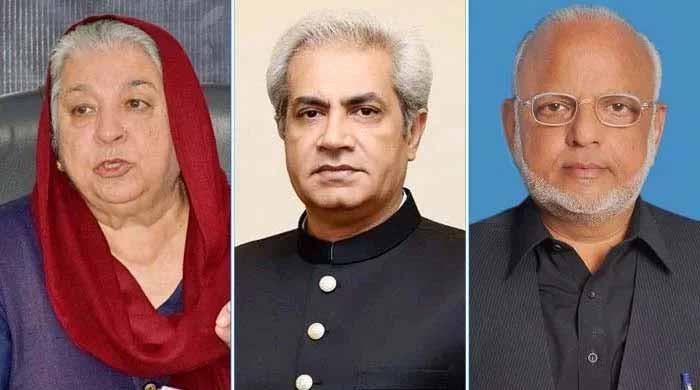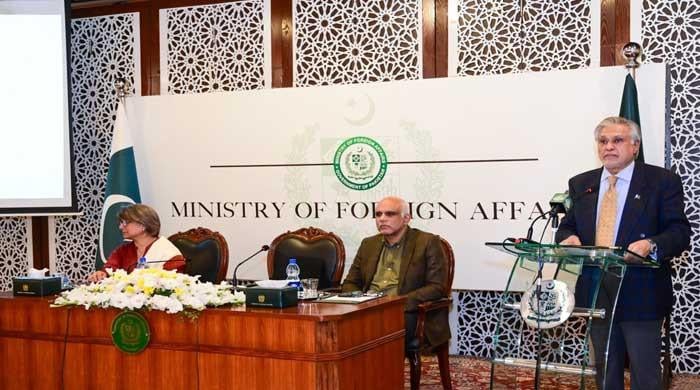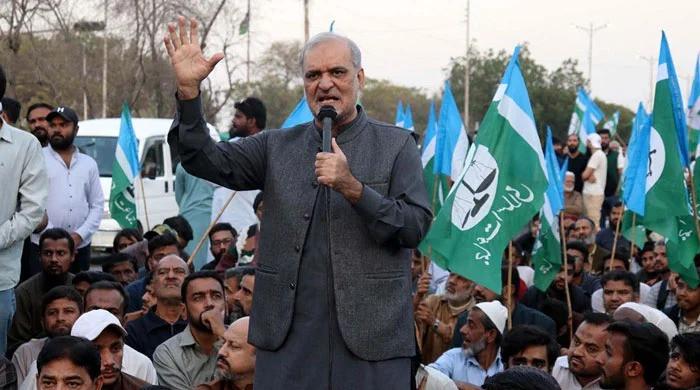Cabinet's decisions today will bring down rampant inflation: Firdous Awan
A 20-kilo bag of flour would now be available for Rs800, while sugar and ghee would be sold at Rs70 and Rs175 a kilo, Dr Awan said
February 11, 2020
ISLAMABAD: The federal cabinet's decisions earlier today would break down the rampant inflation, SAPM on Information and Broadcasting Dr Firdous Ashiq Awan said Tuesday.
Addressing a press conference here in the federal capital after the Cabinet's meeting, Dr Awan said the Utility Stores Corporation of Pakistan (USC) was being given Rs10 billion in subsidies over the next five months — to be disbursed as Rs2-billion monthly payments. The move was aimed to help bring down prices of wheat, rice, sugar, and ghee (oil), she added.
The SAPM said a 20-kilo bag of flour would now be available for Rs800, while sugar and ghee would be sold at Rs70 and Rs175 a kilo, respectively.
Also read: PML-N lawmaker blames PTI govt for wheat, sugar crises
Earlier in the day, PML-N lawmaker Khawaja Asif, while addressing the National Assembly, had blamed the incumbent PTI government for the ongoing wheat and sugar crises, saying it had turned Pakistan into a refuge for the wheat and sugar mafias.
Asif had noted that those who gained the most from ongoing the sugar crisis were the current government's patrons. They were also known as the architects of Prime Minister Imran Khan's administration, he added.
He later further criticised the country's leaders, saying they were absent from an "ongoing debate in the National Assembly about the economy and inflation, as well as the people's issues".
"This is the limit of callousness," the PML-N leader wrote.
Rs500,000 loan to set up more stores
The PTI government's economic team had on Monday proposed a Rs10-15-billion package for the USC, as well as a recommendation to bump up the number of outlets during a meeting chaired by Prime Minister Imran Khan. The relief package for food items would be limited to the utility stores since no plan had been devised to subsidise the commodities' prices at private stores.
It was reported further that loans worth Rs500,000 would be provided to set up utility stores as part of the Kamyab Jawan Programme. In the initial phase, the government plans to establish 1500 such stores.
During the meeting, the premier had also warned of stern action against those responsible for artificially hiking up wheat and sugar prices.
In a tweet on Sunday, he had said he understood the challenges that ordinary people, including the salaried class, were facing as a whole.
He "decided, come what may, my govt will be announcing various measures that will be taken to reduce prices of basic food items for the common man in Cabinet on Tuesday", he had said.
"The nation should rest assured that all those responsible will be held accountable & penalised," he had added.
PM Imran approve sugar export ban
On Saturday, PM Imran had approved a summary seeking to halt the export of 350,000 tonnes of sugar and allow importing 300,000 tonnes through the private sector. The decision, however, was to be implemented after the Economic Coordination Committee's (ECC) approval.
Sources privy to the Sugar Advisory Board's meetings had revealed that a stock of 1.72 million tonnes of sugar was available in the country. The state traditionally maintains a strategic reserve of two months, with a monthly requirement of around 0.46 million tonnes.
Related: PM approves ban on sugar exports in bid to curtail runaway prices
A day prior to that, PM Imran gave the go-ahead for a proposal for the ECC to immediately cancel the remaining export quota of 0.35 million tonnes of sugar and advise the provincial governments to implement the Price Control and Prevention of Profiteering and Hoarding Act at the sub-national level.
It has also been proposed that 300,000 tons of white sugar should be imported through the private sector without taxes and duties.
Is PTI losing the battle against inflation?
However, no other financial support would be provided to the importers by the federal or provincial governments.
'Grand operation'
Last month, the PM had launched a "grand operation" against those responsible for the wheat crisis in Pakistan as flour prices had skyrocketed countrywide. His office had ordered provincial governments, chief commissioners, and deputy commissioners (DC) to initiate stern action against the culprits.
Read more: Amid sugar crisis, Khawaja Asif claims 45 percent mill owners from PTI
Dr Awan had reiterated the same, saying the prime minister took steps to bring stability in the wheat prices.
A report sent to the prime minister earlier had revealed that some senior government officials and politicians were involved in creating the wheat crisis. In some parts of the country, officials had not increased the wheat quota to flour mills in order to create the shortage.
Sugar prices continue to rise
While the stock position was set to improve further based on the availability of three months' worth of sugar stock and crushing being underway, sugar prices have continued to increase regardless. During the incumbent government's 15 months in power, prices shot up to as high as Rs64 a kilo.
In January, the wholesale rate rose from Rs64 to Rs74 per kg and an acute shortage surfaced in the country. The wholesale rate, however, was expected to reach Rs80 a kilo during February.
Related:
After wheat shortage, Pakistan now faces sugar crisis
Rise in sugar, flour prices being probed, says PM Imran
Pakistan apprises IMF of steps taken taken to stabilise food prices









